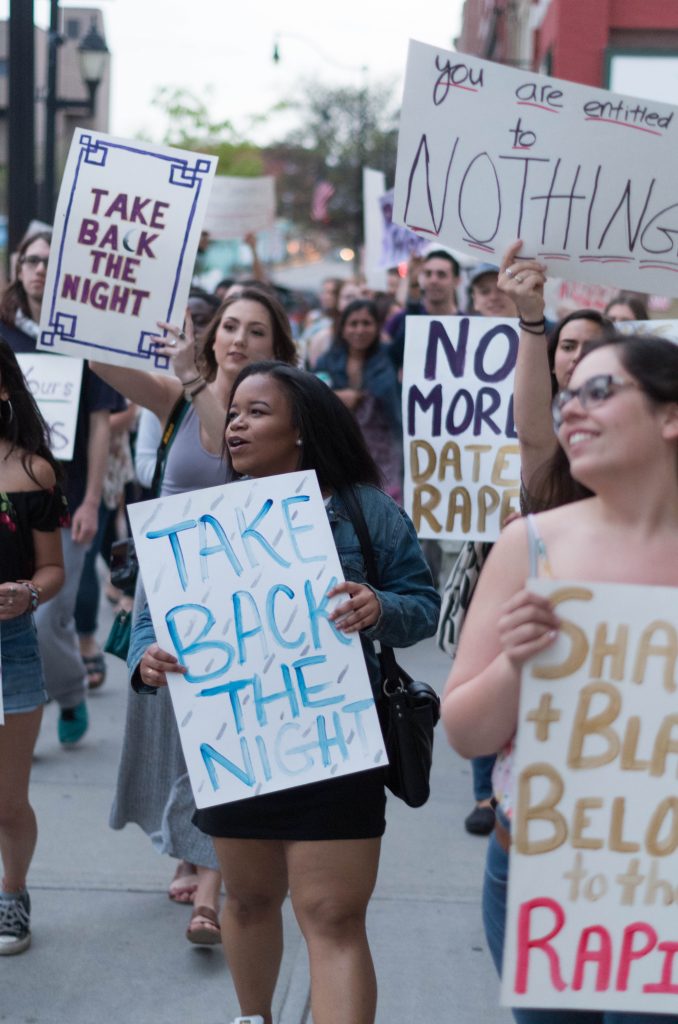The Women’s Student Union (WSU) hosted Binghamton University’s fifth annual Take Back the Night rally Friday evening in Downtown Binghamton. The event coincided with annual marches nationwide, inspired by Take Back the Night, a nonprofit organization founded to create safe spaces and spread awareness about sexual assault and violence.
The event, which began at the Peacemaker’s Stage, kicked off with four speakers before over 50 attendees marched east on Court Street toward Chroma Cafe and Bakery — the site of the event’s Survivors’ Speak-out. The speak out provided a confidential and supportive space for victims of sexual assault and violence to share their stories with others.
Jessica Dunn, the president of WSU and a senior triple-majoring in sociology, Latin American and Caribbean Area studies and Africana studies, opened by discussing the false narrative that frequently surrounds instances of sexual assault or violence. She said that administrators and police officers promote the idea that assailants are strangers, while in reality, most victims know their attackers.
“Why are they lying to us?” Dunn asked. “Why are the police lying to us? Why is the University lying to us? Why is society, at large, leading us to believe that the problem is strangers? The reason is, if we didn’t accept that, we’d have to accept that our friends, our fathers, our boyfriends, our husbands, our co-workers, our acquaintances, our colleagues are rapists and abusers. And that’s a hard thing to accept and a hard thing to deal with.”
WSU’s senior adviser Hannah Pollick, a senior double-majoring in psychology and sociology, said that Take Back the Night rallies encompass a variety of issues surrounding sexual assault, all of which she said WSU discusses and addresses.
“What we appreciate about this rally is that it stands at the intersection of so many different problems that we fight for,” Pollick said. “It is very important to us, and we are going to continue to host it and hope it gets bigger and bigger every year.”
Farihah Akhtar, a junior majoring in political science, addressed social positionality, which is used to describe a person’s social identity in regard to their race, gender and privilege, and how individuals with different experiences can play a role in assault and violence prevention.
“I really want you all to contextualize,” Akhtar said. “For some people, existence isn’t just existence. It is an active form of resistance and it means that our lives are politicized. Us being is politicized. And that’s kind of fucked up. So given your social positionality, you have a role to help that.”
Akhtar also discussed the trend for Americans to examine sexual violence externally in other countries, but to refrain from addressing what goes on in their home country. She said that in order to fully dismantle a culture that perpetuates violence, people must reflect internally.
“Violence against women on all sections exists in all societies and cultures and religions across the board,” Akhtar said. “This is about a structure — masculine, toxic structure — but also about white supremacy.”
Akhtar closed by changing her focus to politics, and the way in which issues frequently addressed by politicians are related to sexual violence and assault.
“It means we care about political things too,” Akhtar said. “It means we care about immigration, it means we care about poverty — because if women can’t afford to leave, how will they leave? And honestly, I talk about this in gendered terms. But we all need to acknowledge that trans women and trans folk have to deal with all this too.”
To close the rally before leading the marchers, Dunn offered a last bit of guidance.
“We’re going to take back this specific night, but we’re also going to take back all of our days,” she said.



